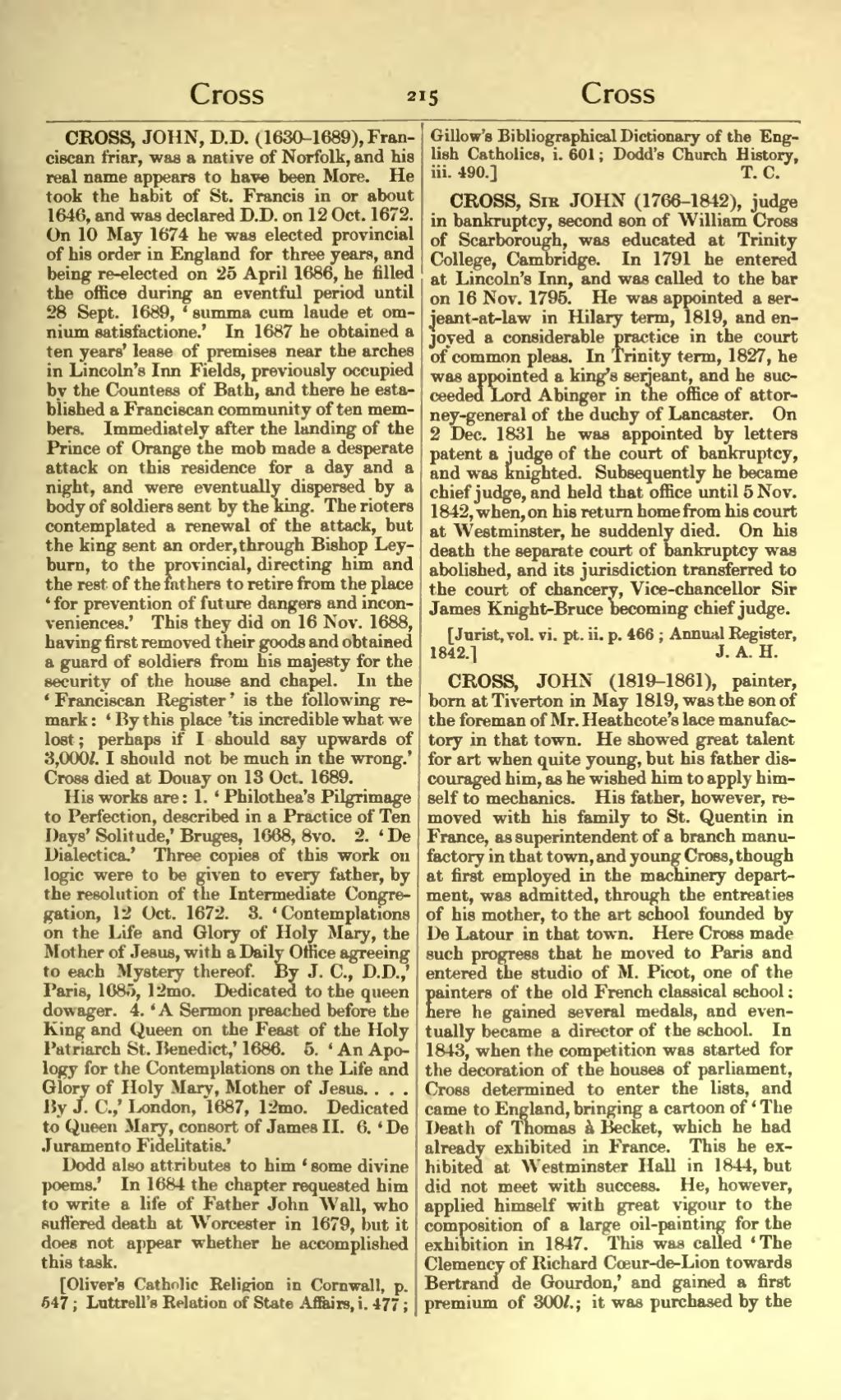CROSS, JOHN, D.D. (1630–1689), Franciscan friar, was a native of Norfolk, and his real name appears to have been More. He took the habit of St. Francis in or about 1646, and was declared D.D. on 12 Oct. 1672. On 10 May 1674 he was elected provincial of his order in England for three years, and being re-elected on 25 April 1686, he filled the office during an eventful period until 28 Sept. 1689, ‘summa cum laude et omnium satisfactione.’ In 1687 he obtained a ten years' lease of premises near the arches in Lincoln's Inn Fields, previously occupied by the Countess of Bath, and there he established a Franciscan community of ten members. Immediately after the landing of the Prince of Orange the mob made a desperate attack on this residence for a day and a night, and were eventually dispersed by a body of soldiers sent by the king. The rioters contemplated a renewal of the attack, but the king sent an order, through Bishop Leyburn, to the provincial, directing him and the rest of the fathers to retire from the place ‘for prevention of future dangers and inconveniences.’ This they did on 16 Nov. 1688, having first removed their goods and obtained a guard of soldiers from his majesty for the security of the house and chapel. In the ‘Franciscan Register’ is the following remark: ‘By this place 'tis incredible what we lost; perhaps if I should say upwards of 3,000l. I should not be much in the wrong.’ Cross died at Douay on 13 Oct. 1689.
His works are: 1. ‘Philothea's Pilgrimage to Perfection, described in a Practice of Ten Days' Solitude,’ Bruges, 1668, 8vo. 2. ‘De Dialectica.’ Three copies of this work on logic were to be given to every father, by the resolution of the Intermediate Congregation, 12 Oct. 1672. 3. ‘Contemplations on the Life and Glory of Holy Mary, the Mother of Jesus, with a Daily Office agreeing to each Mystery thereof. By J. C., D.D.,’ Paris, 1685, 12mo. Dedicated to the queen dowager. 4. ‘A Sermon preached before the King and Queen on the Feast of the Holy Patriarch St. Benedict,’ 1686. 5. ‘An Apology for the Contemplations on the Life and Glory of Holy Mary, Mother of Jesus. … By J. C.,’ London, 1687, 12mo. Dedicated to Queen Mary, consort of James II. 6. ‘De Juramento Fidelitatis.’
Dodd also attributes to him ‘some divine poems.’ In 1684 the chapter requested him to write a life of Father John Wall, who suffered death at Worcester in 1679, but it does not appear whether he accomplished this task.
[Oliver's Catholic Religion in Cornwall, p. 547; Luttrell's Relation of State Affairs, i. 477; Gillow's Bibliographical Dictionary of the English Catholics, i. 601; Dodd's Church History, iii. 490.]
CROSS, Sir JOHN (1766–1842), judge in bankruptcy, second son of William Cross of Scarborough, was educated at Trinity College, Cambridge. In 1791 he entered at Lincoln's Inn, and was called to the bar on 16 Nov. 1795. He was appointed a serjeant-at-law in Hilary term, 1819, and enjoyed a considerable practice in the court of common pleas. In Trinity term, 1827, he was appointed a king's serjeant, and he succeeded Lord Abinger in the office of attorney-general of the duchy of Lancaster. On 2 Dec. 1831 he was appointed by letters patent a judge of the court of bankruptcy, and was knighted. Subsequently he became chief judge, and held that office until 5 Nov. 1842, when, on his return home from his court at Westminster, he suddenly died. On his death the separate court of bankruptcy was abolished, and its jurisdiction transferred to the court of chancery, Vice-chancellor Sir James Knight-Bruce becoming chief judge.
[Jurist, vol. vi. pt. ii. p. 466; Annual Register, 1842.]
CROSS, JOHN (1819–1861), painter, born at Tiverton in May 1819, was the son of the foreman of Mr. Heathcote's lace manufactory in that town. He showed great talent for art when quite young, but his father discouraged him, as he wished him to apply himself to mechanics. His father, however, removed with his family to St. Quentin in France, as superintendent of a branch manufactory in that town, and young Cross, though at first employed in the machinery department, was admitted, through the entreaties of his mother, to the art school founded by De Latour in that town. Here Cross made such progress that he moved to Paris and entered the studio of M. Picot, one of the painters of the old French classical school; here he gained several medals, and eventually became a director of the school. In 1843, when the competition was started for the decoration of the houses of parliament, Cross determined to enter the lists, and came to England, bringing a cartoon of ‘The Death of Thomas à Becket,’ which he had already exhibited in France. This he exhibited at Westminster Hall in 1844, but did not meet with success. He, however, applied himself with great vigour to the composition of a large oil-painting for the exhibition in 1847. This was called ‘The Clemency of Richard Cœur-de-Lion towards Bertrand de Gourdon,’ and gained a first premium of 300l.; it was purchased by the
